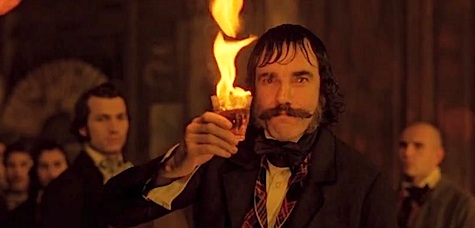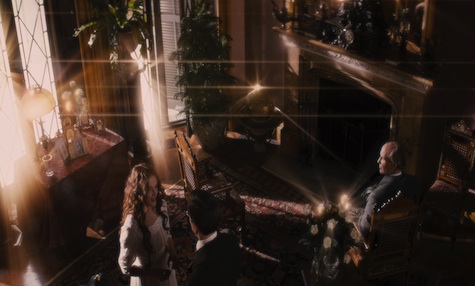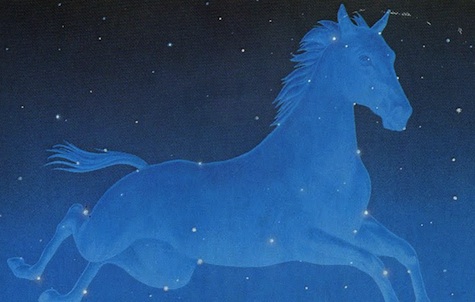This book. Did you know it was a book? Did you know it’s going to be a questionable movie this week? There’s a magic horse in it.
Mark Helprin’s Winter’s Tale is such an odd brick of a thing. It’s essentially a fantasy novel set in a New York City that isn’t New York City, except actually it’s a character drama steeped in magical realism and the actual character you’re following is the coming and going of New York City itself. And maybe not even that.
I think the magic horse is supposed to represent God?
I’m being dismissive, but that’s the kind of attitude that Winter’s Tale tends to bring out in some readers. Of course, if that were the only reaction the book garnered we wouldn’t be considering it today. For every snide remark made, Helprin’s genre-defying doorstopper also provokes an equal and opposite feeling of rapture within the reader. The sheer emotional distance between these two reactions is fascinating. You can find someone who will eagerly tear the book down and someone who will just as eagerly tell you about how the book changed their life, and neither reaction would be a misreading of the text. Winter’s Tale’s failures and triumphs are so cohesively bound together that it becomes required reading solely on the basis of how you will react to it.
How those failures and triumphs (we’ll get to those) mix with each other to form Winter’s Tale makes the 1983 near-classic of particular note to readers of genre fiction. It occupies an interesting cultural space at the moment, stuck between what is classically considered epic fantasy and what is currently considered literary fiction. The book has been ballyhooed enough since its release that you could safely bunch it in with David Foster Wallace’s Infinite Jest. Both books present a similar challenge and hold a similar esteem in the eyes of those contemplating that challenge. Both books re-paint the real world into something a little less known, a little more magical, and both of them expect the detail dedicated to these skewed worlds to propel the plot in a way that is baffling to readers accustomed to more conventional fiction.
They’re also both massive, massive tomes that don’t really end. (Spoilers?) And although Winter’s Tale is one of the most memorable books you’ll probably ever read, it’s also one of the most frustrating. You can read it from start to finish and never know what happened in the story. What follows is the best recollection I can muster. (I hope those of you in the front row brought a tarp. This is going to get messy.)
We begin in early 20th century steampunk New York City where we follow the tale of greasy mechanic Peter Lake. He’s helping build the Brooklyn Bridge and he’ll time travel later to see it finished so I think, in a sense, his arms encircle the city because working class? Just like the weird cloud wall that circles the city, bobbling up and down and eating anything that tries to travel through it. Sometimes. There’s lots of travel through it later and the city sustains itself somehow so, I don’t know. This might have been a first draft concept ditched in later drafts but too cool to get rid of entirely.
Peter Lake breaks into the home of the wealthy Penn family and when I say wealthy I mean Rockefeller-type-bedrock-of-the-city-our-name-is-on-everything-how-do-you-even-pronounce-Schermerhorn? wealthy. So wealthy that their house gets to be in Central Park (I think) because why not, they pay for it possibly. He ends up falling in love with the Penns’ sick daughter Beverly.
Beverly is weird. She insists on always being in freezing temperatures, is ethereal in her beauty, writes equations she thinks describe the movements of the universe despite having no training in the sciences, and although she is young and terminally ill, she is Wise Beyond Her Years and lives on an actual pedestal on the roof of the house.

Beverly has to die! She is too special for this world and so the plot demands that her Constant Tuberculosis must eat her away from within. Peter Lake and Beverly Penn must have a romance that shakes the heavens and ends in tragedy or else Peter has no reason to abandon his newfound sophistication and get chased into the future by his old gang.
HIS OLD GANG. I almost forgot about those guys. They keep showing up in the plot demanding to be taken seriously as a threat, existing within this space of banality in society, too boring to be taken seriously and too hyper-violent to stick around and get caught doing bad things. Their leader is named Pearly Soames and honestly all I imagine upon hearing that name is this:

Pearly’s gang is maybe a symptom of a larger class war brewing in the city but this isn’t explicit and really I might be imagining this because Peter Lake and Beverly’s courtship is so lacking that I have to make things up to pass the time.
Here is how the Beverly/Penn romance actually progresses:
- Peter breaks into their house and watches Beverly take a bath.
- Peter gets a quick approval from the Penn patriarch.
- Beverly and Peter go to a dance.
- Beverly dies offscreen.
- You put the book down and go do something constructive.
There’s still 3/4ths of Winter’s Tale to go after this and author Mark Helprin isn’t done throwing page-long descriptions of snow drifts at you, so he starts over and suddenly we are following a single mother, an industrial heir, and a couple other people who I kept forgetting the purpose of, about a century later as the year 2000 approaches.
Keep in mind that this was written largely in the late 1970s, so its vision of a millennial New York City is informed by the awful state that the city was in at that time. The streets of this NYC 1999 are empty of double-deckered tour busses advertising TV shows that debuted two months ago, Times Square is empty of Olive Gardens and those Olive Gardens are similarly empty of young Ryan Britts. Williamsburg isn’t happening yet. There are probably blimps everywhere.
These new characters slowly come together and form a literati of sorts under the umbrella of what is apparently the most noble newspaper in the history of mankind, The Sun. These characters are only characters in the sense that they are people with names who conduct actions that we can follow from page to page. In every other sense of the word they are empty. And gifted! So gifted. One of them makes his way to the city by playing flawless games of poker, even though he’s never played poker in his life, because he’s just so attuned to greatness or the One Power or something that he can go inside himself and…you know, I don’t even know. These characters are all simply presented to us as The Privileged, which is possibly the worst way to get us to sympathize with them.
They all land jobs at The Sun and exploring New York City through this lens makes them fall in love with it and each other. It’s at this point that the word “just” starts to get layered in more thickly. Not “just” as in “I just want relatable characters” but “just” as in “This is a most just and honorable sandwich.” (SPOILER: There are no sandwiches in this book.)
To honor the 500th straight description of winter, Winter’s Tale begins assembling the idea that every thread that has been precipitously dropped so far will come back into play, kicking off a chain reaction that will result in this near-magical NYC being transmuted into a literal heaven on Earth.
Helprin is a charismatic enough writer to pull this kind of metaphysical twist off. I joke that there are about 500 descriptions of winter in this book, and there are, but those descriptions are rich, varied, evocative descriptions nonetheless. Helprin’s visuals glimmer boundlessly and he’s possibly one of the few writers living whom you could trust to describe Heaven arriving on Earth.
Unfortunately, this also means he writes very broadly as a result. Things happen in Winter’s Tale because the author requires it, or because they’re meant to represent a philosophical tenet, or meant to evoke religious myth, not because the characters are reacting emotionally (or even physically) to what they experience. When the author needs Beverly and Peter to fall in love, they do so immediately. When the single mother (Virginia) needs a job, she runs into people who are so sparkled by her knowledge and wit (undemonstrated to the reader) that they give her a job for life. When a secondary character threatens to run for mayor as an anarchist joke, he actually succeeds. The story becomes flat and unengaging as a result. The characters do random things, succeed, and move on to the next random thing. And it is always ever winter.
Then, the ending: [highlight to read]
Peter Lake gets spat back out into the future (sans magic horse!), gets a job serving the literati, and sacrifices his life so that a child that fell sick can be reborn? Also, some other folks are getting really excited about the construction of significant decreases in rent a bridge of light that will usher in a state of heaven in NYC.
This is possibly the ultimate insult to Pearly Soames and his gang. They are so boring that the book itself has shifted to a timeframe where they are sure to have perished long ago, either through fire, or drinking, or drinking fire. Soames cannot stand for this, so he and the gang also hop into the future somehow and burn the city down before the bridge of light can align.[end highlight]
Imagine if your favorite epic fantasy series spent book after book building its world, ensuring that there was a reason we were following seemingly insignificant characters, and then just gave up. No stunning victory or bittersweet defeat. Just…nothing. A great big, “Nevermind. Turns out there was no point to any of this, and the world will keep spinning whether we’re paying attention to it or not. But hey, cool magic horse, right?” That’s the feeling you get after reading Winter’s Tale. The investment you put into this book disappears. To those of us accustomed to epic fantasy, or genre fiction in general, it’s hard to imagine why this book is held in such esteem.
Despite the drunken Jenga pile that its story consists of, Winter’s Tale is rewarding in a way that only the truly best genre fiction and epic fantasy can be. The world depicted in this book resonates with you long after you’ve thrown your paperback copy into the snow bank outside your front door.
I can list a handful of moments that have stuck with me in the years since I’ve read the book. (And it has been years, in case the above cracked-out description of the plot didn’t make that apparent.) Some are to the book’s detriment but some of these moments are so unique that they can only have been borne of the specific mixture of fantasy and reality that Winter’s Tale provides.
The shimmering, massive, undulating cloud wall is one. By simply stating that it’s there, Helprin effectively cuts us off from reality while simultaneously spurring on a sense of exploration and adventure. The dank caves where Pearly Soames and his gang lurk wind through NYC’s massive aqueducts and underground waterways, making it feel as if there’s a world hanging upside down beneath Manhattan, running and churning and destroying any who come too close to it.
Winter itself becomes visualized in a number of ways, from how the city expands onto the frozen Hudson River (seems impossible now that hitting zero-degree temps is so rare in the city, but Helprin is exaggerating only a little) to snow drifts so high they must be scaled like mountains. Beverly herself becomes an enrapturing figure when you imagine her upon the roof, peering into a night with stars just a little too large to be real, so weightless she is nearly transparent.
Helprin has a real gift in suffusing his visuals with breath and light, so much so that it would take a truly gifted filmmaker to translate that to the screen. (There would have to be lens flare, but not just lens flare.) Deep blues, snowblind whites, and swaths of bronze color the world that Helprin depicts. The air of the very novel carries a winter crisp to it and even at their warmest, you can’t help but imagine a chill constantly edging in around the characters. When the book unveils its Big Idea: that the contours of NYC in winter, when perfected, can combine all light to form a bridge to heaven, you believe it.

Winter’s Tale becomes a love letter to New York City in this regard, and that adoration can be found all throughout the book in the care Helprin takes to describe the sheer variety of what can be found here, both in the present day and throughout the city’s history. You can go from the utter chaos of Five Points, to the massive industrialization of Brooklyn Bridge, to the long-since paved over oyster swamps of Red Hook, to the posh tranquility of the Penn Manor, to the caverns lurking beneath our feet, to the buzz and ink of The Sun, and on and on.
In a roundabout way, by making New York City a near-fantasy kingdom Winter’s Tale succeeds in defining the city’s true appeal. Enhancing it via magical realism brings out its true vibrancy as a city where, on your best days you’ll find yourself slipping between any number of worlds and across any number of stories. There is chaos in New York City, but there is also tremendous glory, and Winter’s Tale understands that in a way that a more direct narrative could not visualize. I love the book for pulling this off by using the conventions of genre. Here is where the book triumphs.
And overall, that’s probably why the book is such highly esteemed recommended reading. You’re either going to hate it or you’re going to love it, but either way you’re going to feel something. Ultimately that may be the key to it standing the test of time and becoming a piece of classic literature. Winter’s Tale doesn’t require your approval to be an evocative experience. Its world will exist with or without your eyes.
For artists and writers, especially those who favor genre fiction, Winter’s Tale is perhaps most importantly a horizon-broadening experience. You can go this far afield in your narrative, craft lush vistas that none will ever truly see, weave the past and future into something new. Essentially, Winter’s Tale is a roadmap to keep you pushing the world you’re creating, or the canvas you’re painting, into new territories. Even if the end product does frustrate the hell out of certain people writing this article.
Now if you’ll excuse me, I should probably go retrieve my copy from the snow bank outside my front door.
Chris Lough had a whole Infinite Jest sex joke he ended up cutting from the article for clarity. When he’s not being mean about Winter’s Tale you can find him being mean about Agents of S.H.I.E.L.D. on Tor.com. And probably on Twitter.










